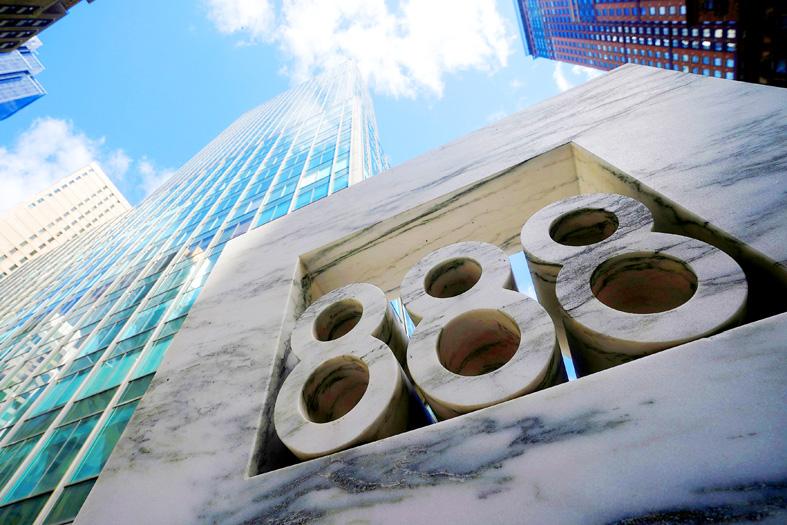The collapse of the Archegos Capital Management LLC fund last month is only the most recent example of how extreme liquidity can make financial markets more volatile and sometimes lead to bizarre outcomes.
Another dramatic instance came in late January, when shares of GameStop Corp skyrocketed following a buying frenzy coordinated by retail investors eager to defend the video game retailer from funds betting against it.
Shares of GameStop have since retreated, but the episode shined an uncomfortable light on online trading platforms and speculative investment funds involved in the financial melee.

Photo: Reuters
In the case of Archegos, leading banks appear poised for hefty losses following billions of dollars in sudden stock liquidations by a fund that had large market exposure backed by very little cash.
Then there has been the wave of special purpose acquisition companies, known as SPACs, which have entered public markets through transactions with fewer rules than traditional stock offerings.
All of these cases show how a flood of liquidity in the wake of accommodative monetary policy is changing Wall Street.
“Stocks have risen extremely quickly from their lows last March, but there is still plenty of liquidity out there,” Meeschaert Financial Services LLC president Gregori Volokhine said.
The US Federal Reserve has been aggressive in pumping funds into the financial system, while US President Joe Biden and his predecessor Donald Trump signed sweeping fiscal packages that primed households and businesses with funds.
“I just don’t know that we’ve seen this much money hit the system this fast between what we’ve seen in stimulus checks and now what we’re going to see with infrastructure,” said TD Ameritrade Holding Corp market strategist JJ Kinahan, alluding to Biden’s US$2 trillion infrastructure plan announced last week.
Some of the volatility is also the result of investors trying to navigate shifts in the market as the economy rebounds with more people vaccinated against COVID-19 and technology shares that prospered during lockdowns lose some of their luster.
“Enterprising investors know they need to find other vehicles besides software, social networks and e-commerce stocks,” Volokhine said. “They’re looking for ways to make more money.”
Implosions such as Archegos’ can happen when funds are “looking to differentiate their returns, which is harder do in a bull market,” Kinahan said.
The churn in the market is sparking talk of more financial regulation. In the wake of GameStop, lawmakers have grilled online trading platform Robinhood over its moves to temporarily restrict trading amid the frenzy.
Robinhood, which itself plans to go public, has also been questioned about its relationships with hedge funds that do business with it.
The Archegos debacle has focused debate on swaps, derivative transactions that can allow big, high-risk bets with small upfront payments.
The opacity of the swaps market makes it a prime candidate for new rules from the Securities and Exchange Commission, Volokhine said.

South Korea’s equity benchmark yesterday crossed a new milestone just a month after surpassing the once-unthinkable 5,000 mark as surging global memory demand powers the country’s biggest chipmakers. The KOSPI advanced as much as 2.6 percent to a record 6,123, with Samsung Electronics Co and SK Hynix Inc each gaining more than 2 percent. With the benchmark now up 45 percent this year, South Korea’s stock market capitalization has also moved past France’s, following last month’s overtaking of Germany’s. Long overlooked by foreign funds, despite being undervalued, South Korean stocks have now emerged as clear winners in the global market. The so-called “artificial intelligence

Chinese artificial intelligence (AI) start-up DeepSeek’s (深度求索) latest AI model, set to be released as soon as next week, was trained on Nvidia Corp’s most advanced AI chip, the Blackwell, a senior official of US President Donald Trump’s administration said on Monday, in what could represent a violation of US export controls. The US believes DeepSeek will remove the technical indicators that might reveal its use of American AI chips, the official said, adding that the Blackwells are likely clustered at its data center in Inner Mongolia, an autonomous region of China. The person declined to say how the US government received

‘SEISMIC SHIFT’: The researcher forecast there would be about 1.1 billion mobile shipments this year, down from 1.26 billion the prior year and erasing years of gains The global smartphone market is expected to contract 12.9 percent this year due to the unprecedented memorychip shortage, marking “a crisis like no other,” researcher International Data Corp (IDC) said. The new forecast, a dramatic revision down from earlier estimates, gives the latest accounting of the ongoing memory crunch that is affecting every corner of the electronics industry. The demand for advanced memory to power artificial intelligence (AI) tasks has drained global supply until well into next year and jeopardizes the business model of many smartphone makers. IDC forecast about 1.1 billion mobile shipments this year, down from 1.26 billion the prior

FORTUNES REVERSED: The new 15 percent levies left countries with a 10 percent tariff worse off and stripped away the advantage of those with a 15 percent rate In a swift reversal of fortunes, countries that had been hardest hit by US President Donald Trump’s tariffs have emerged as the biggest winners from the US Supreme Court’s decision to strike down his emergency levies. China, India and Brazil are among those now seeing lower tariff rates for shipments to the US after the court ruled Trump’s use of the International Emergency Economic Powers Act to impose duties was illegal. While Trump subsequently announced plans for a 15 percent global rate, Bloomberg Economics said that would mean an average effective tariff rate of about 12 percent — the lowest since